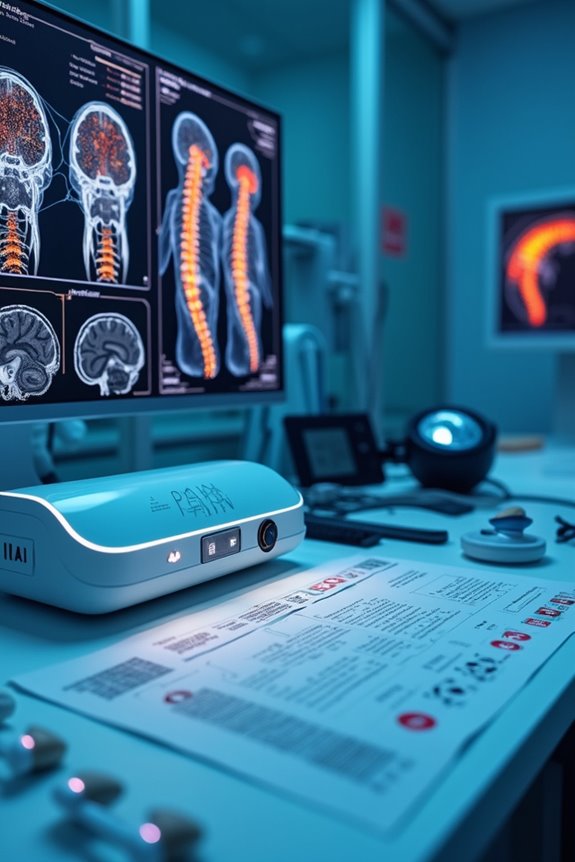Patient registries are essential in pain research. They systematically collect clinical and observational data on pain disorders. This includes evidence on treatment outcomes and patient experiences. Registries enable the classification of pain conditions, facilitating precision medicine. They provide longitudinal data to track treatment efficacy over time. Additionally, patient-reported outcomes enhance insights into symptom burden. By linking healthcare and research, registries inform clinical practices. Continued exploration reveals even more about their impact on pain management strategies.
Key Takeaways
- Patient registries provide centralized databases that collect clinical and observational data, enhancing understanding of pain disorders and treatment outcomes.
- They facilitate the identification of trends in patient populations, enabling targeted therapies and improving treatment efficacy.
- Longitudinal data from registries allow for the assessment of chronic pain progression and treatment efficacy over time.
- By incorporating patient-reported outcomes, registries capture insights on symptom burden and inform healthcare innovations.
- Registries bridge healthcare and research, promoting collaboration among clinicians, researchers, and policymakers to improve pain management strategies.
Understanding Patient Registries in Pain Management
Patient registries in pain management are systematically organized databases that collect uniform clinical and observational data on pain disorders. These registries are essential in capturing diverse registry types, including disease-specific and specialty registries, which focus on enhancing care in pain management.
Key functions of pain registries include:
- Data Collection: They gather information on treatments, patient outcomes, and therapies.
- Tracking: Registries monitor longitudinal outcomes, evaluating treatment effectiveness over time.
- Standardization: They promote consensus-based pain outcome measures to harmonize data collection.
- Quality Improvement: Registries support benchmarking and collaborative initiatives among pain specialists.
The Importance of Patient-Reported Outcomes

The significance of Patient-Reported Outcomes (PROs) in pain research cannot be overstated, as they provide essential insights into the subjective experiences of individuals suffering from pain.
- PRO validity is vital for accurate symptom assessment, enabling researchers to understand cancer-related pain intensity and associated burdens effectively.
- Instruments like the Brief Pain Inventory serve as gold standards, aiding in the standardization of PROs for comparability and reliability.
- Tools such as the MD Anderson Symptom Inventory capture broader symptom profiles, enhancing data richness.
- Electronic methods for collecting PROs facilitate large-scale studies, increasing flexibility and data analysis capabilities.
- Ultimately, thorough PRO approaches contribute to identifying complex symptom clusters, advancing the understanding of pain dynamics in various conditions.
Enhancing Precision Medicine Through Registries

Enhancing precision medicine through registries represents a pivotal advancement in pain research.
- Registries facilitate the classification of diverse pain conditions into distinct subtypes by utilizing clinical, genetic, and phenotypic data.
- This subtyping enables targeted therapies, improving treatment efficacy and minimizing adverse effects.
- The identification of novel biomarkers linked to specific pain mechanisms is possible within these subgroups, enhancing preventive strategies by recognizing high-risk profiles.
- Data integration from registries encompasses demographics, genetics, and treatment responses, supporting machine learning models that predict individual risk.
- Robust datasets enhance statistical power to detect subtle patterns, informing clinical decision-making and improving patient outcomes.
Longitudinal Data and Its Impact on Treatment

Longitudinal data plays an essential role in understanding the dynamics of pain treatment over time. By continuously collecting health information from the same patients, researchers can identify longitudinal trends in chronic pain progression, including fluctuations in symptom severity. This data enables:
- Assessment of treatment efficacy across various interventions.
- Observation of patterns in patient responses, such as time to improvement.
- Evaluation of long-term safety and adverse effects associated with treatments.
Moreover, longitudinal registries facilitate the comparison of clinical outcomes and predictive factors, ultimately guiding personalized treatment approaches. Continuous data collection enhances understanding of risk factors influencing treatment responses, thereby optimizing protocols based on real-world evidence. Consequently, longitudinal data is vital for advancing pain management strategies and enhancing overall patient care.
Bridging Healthcare and Research

Patient registries serve as an essential link between healthcare delivery and research, fostering a landscape where clinical practice is informed by real-world evidence.
- Registries integrate extensive health data, facilitating personalized treatment approaches.
- By incorporating patient-reported outcomes, they capture critical insights on symptom burden and quality of life.
- This dynamic data helps clinicians monitor individual health trajectories and treatment responses.
Moreover, registries provide a framework for healthcare innovation, identifying gaps in care and areas needing new interventions.
- Ethical data governance guarantees responsible use of patient information, fostering trust among stakeholders.
- By aligning clinical data with research priorities, registries promote collaboration among clinicians, researchers, and policymakers, ultimately enhancing pain management strategies.
Supporting Evidence-Based Guidelines
While clinical practice guidelines are essential for optimizing pain management, their development increasingly relies on real-world evidence derived from registries. Patient registries collect longitudinal data, enabling rigorous assessment of treatment variability and long-term outcomes. This evidence informs guideline development, ensuring recommendations are grounded in actual clinical practice.
Key contributions of registries include:
- Capturing diverse patient demographics, enhancing guideline relevance.
- Standardizing data elements to maintain consistency across studies.
- Identifying gaps in treatment practices, guiding evidence-based refinements.
Moreover, ongoing data collection from registries supports continuous validation of guidelines, allowing for timely updates that reflect evolving treatment patterns and emerging evidence. Ultimately, registries play a vital role in promoting effective, personalized pain management through robust, evidence-based guidelines.
Addressing Biopsychosocial Aspects of Pain
Addressing the biopsychosocial aspects of pain is crucial for effective pain management strategies. Patient registries collect thorough data, encompassing biological, psychological, and social domains, to reflect the complexity of pain experiences.
- Biopsychosocial interactions are analyzed to understand how psychological and social contexts influence pain severity and treatment responses.
- Registries document psychosocial determinants such as depression, anxiety, and socioeconomic factors, aiding in identifying at-risk patients and facilitating targeted interventions.
- Longitudinal monitoring tracks changes over time, enhancing the understanding of pain progression and response to therapies.
- Integration of validated instruments guarantees standardized capturing of biopsychosocial variables, guiding clinicians in developing personalized pain management strategies tailored to individual needs.
The insights derived from these registries considerably contribute to a holistic approach in pain research.
Legacy Data and Its Influence on Future Generations
How does legacy data from patient registries shape the future of healthcare? The legacy influence of these registries greatly impacts generational health outcomes. Data collected over decades provides insights into genetic and rare diseases, fostering breakthroughs that benefit future generations through enhanced treatment protocols.
- Longitudinal patient data aids in understanding disease progression.
- Patient involvement is less burdensome than clinical trials, ensuring extensive data collection.
- Registries like the Cystic Fibrosis Foundation exemplify how historical data transforms fatal diseases into manageable conditions.
This cumulative data not only informs clinical guidelines but also supports predictive analytics and personalized medicine, ensuring that treatments evolve with changing populations. Consequently, the generational impact of legacy data is profound, steering the course of future healthcare innovations.
Frequently Asked Questions
How Are Patient Registries Maintained and Updated Over Time?
Patient registries are maintained through automated data entry processes, enhancing patient engagement. Regular updates guarantee data accuracy, while adherence to ethical guidelines fosters trust and encourages ongoing participation, creating a sense of belonging within the research community.
What Are the Costs Associated With Establishing a Patient Registry?
In the garden of patient registries, cost analysis reveals varied seeds; initial investments flourish between $0.5 million and $2 million. Diverse funding sources nurture growth, ensuring these essential plants thrive amidst challenges and complexities.
Who Oversees the Ethical Standards of Patient Registries?
Ethical oversight of patient registries is typically managed by institutional review boards and ethics committees, ensuring regulatory compliance. These bodies safeguard participant rights, fostering trust and integrity in the research process for all involved.
How Is Patient Privacy Ensured in Registry Data Collection?
Patient privacy in registry data collection is safeguarded through robust data anonymization techniques and thorough informed consent processes. These measures create a fortress of trust, ensuring that individuals feel secure while contributing their valuable health information.
What Challenges Do Researchers Face When Using Registry Data?
Researchers encounter challenges with registry data, including concerns over data accuracy and participant engagement. These issues hinder the reliability and completeness of findings, making it difficult to foster a sense of belonging within the research community.





